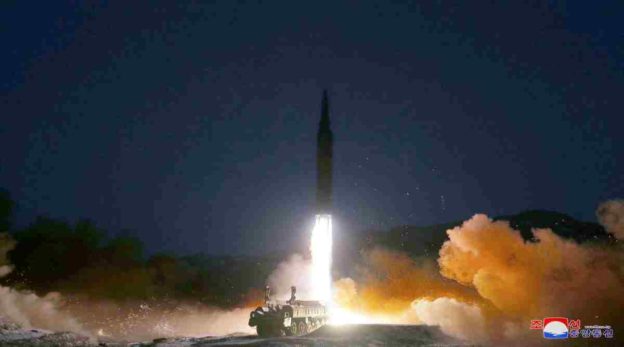The Russia – Ukraine conflict that surfaced even with the presence of immense international pressure has emboldened countries to throw caution to the wind.
North Korea has Japan and South Korea worried with the successful test of their most advanced ICBM yet – the Hwasong -17. The experts have claimed that it is a ‘monster missile’, North Korea has tested several Intercontinental Ballistic Missiles in the past and also tested one earlier this year which failed immediately after launch. However, the Hwasong – 17 showed no signs of weakness and remained in the air for more than an hour and flew at an altitude of 6000 km, which is considerably higher than its predecessor Hwasong – 15 that was launched in 2017. While the North Korean leader was quick to mention that the weapon was a key to deterring a nuclear war, these increasing trajectories have Japan, South Korea, and the US visibly and understandably worried. While it is important to analyse the impact this ICBM has on the Asian security architecture, it is also important to realise that this test points to a trend of growing dismissal of the largely agreed upon rules of global conflict management.
Economic sanctions, international condemnation, breaking of trade ties, and international pressure used to act as strong deterrents for countries. However, the Russia – Ukraine conflict that surfaced even with the presence of immense international pressure has emboldened countries to throw caution to the wind. The perceivable shift in the axis of power has observable consequences and some parts of the world are suffering these consequences at the present moment.
The Russia – Ukraine conflict has grabbed the world’s attention for some time now and with each passing day the conflict manages to survive longer than anyone could have predicted. While the conflict has been analysed and interpreted with every possible theory and model of great power politics and international relations theory, it is quickly becoming clear that there is a fundamental difference in the character of the conflict when compared to all of the previous wars and skirmishes that the world has seen since the cold war. Tom McTague in 2020 wrote about the Geopolitical after effects of the Pandemic, in the Atlantic; arguing in essence that the institutions of western world that form the fundamentals of western politics would be irrevocably altered due to the pandemic and the breakdown of the patterns of globalisation as the world has come to recognise them.
While this is true to an extent one could argue that the spread of the Covid- 19 virus and the response of the world to the pandemic is not the root cause of this shift but a catalyst to a shift that has been gradually taking place for some decades. International pressure on countries to take responsibility for their actions or the threat of ramifications for their indiscretions seems to have waned in the recent past. In the past there has been considerable restraint shown by most of the world, particularly the west in context of global regime policies, conflict management, and also in the name of pressure from the UN and other countries. However, the trend seems to be changing now. The Russian aggression towards Ukraine and their defiance in the face of sanctions and global condemnation has emphasized the clearly diminishing significance of such actions.
This change has not happened overnight and is not the consequence of a single event; it is the cumulative effect of the locus of power shifting and the rise of a certain kind of ‘strong-man’ authoritarian politics that has found both acceptance and appreciation among large sections of society around the world. There is also the abrupt retrieval of the US from global politics during the Trump era, while Biden has attempted to mend those ties; the hasty US led retrieval of NATO forces from Afghanistan has led to declining European faith in the US. Simultaneously the world has witnessed and acknowledged the rise of Chinese power and the expansion of its presence around the world.
The Chinese ambivalence to widely agreed upon international code of conduct has considerable precedence. Their almost imperial expansion in the South China Sea, the conundrum about the 9 Dash Line, their meddling and the eventual take over of Hong Kong and now their clear hints towards their unhappiness with the situation of Taiwan, all stand as proof to not just the Chinese ambition of global expansion but also the reality of the progressive realisation of that ambition. It is also important to note that while the Chinese might not be able to match with the US in military technology yet, the trade wars between US and China showed that China can guarantee ‘mutually assured economic destruction’. This is a threat that the US has not had to face since the cold war, nor has the rest of the world had to contemplate the consequences of such an economic destruction.
This perception of a certain kind of equality has also added to the world observing sanctions and international opinion with escalating nonchalance. This receding of global gatekeeping by international organisations and the US is bound to have adverse impact in the context of conflicts and aggressive behaviour on the parts of countries and authoritarian leaders around the world. It would not be inaccurate to say that the world stands at a precipice of growing militarisation of regions and greater volatility around the world.
https://www.financialexpress.com/world-news/north-korea-china-russia-and-the-shift-in-global-power-dynamics/2471828/





